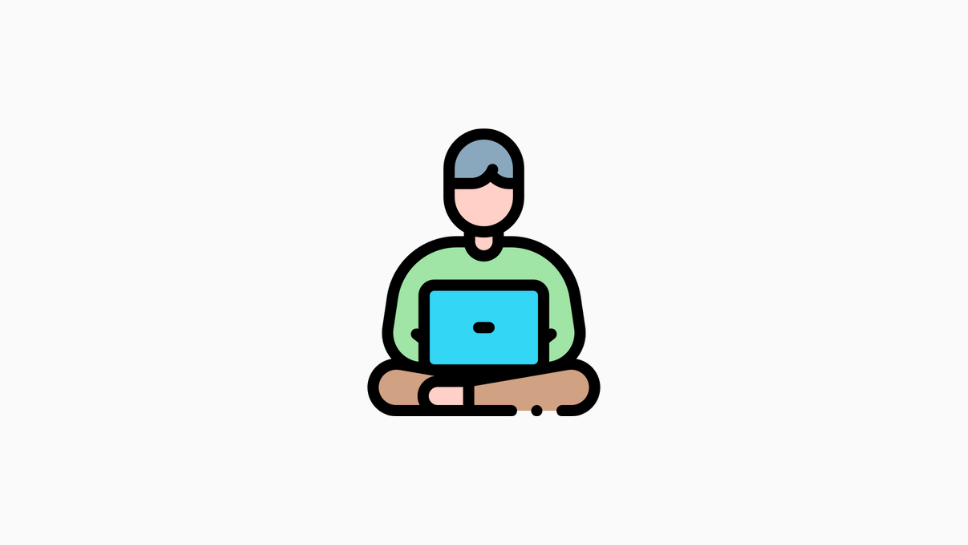Table of Contents
I can work from anywhere in the world.
Over the last 12 months I’ve worked from Portugal, Australia, Sweden, Spain, Morocco, and a whole tonne of other places around the world – let me explain how.
💰 The Money Matrix
One of the most common questions people ask is “how do I afford to work and live from all these beautiful places?”. And my response is usually something along the lines of “it’s not actually that expensive”.
Now, don’t get me wrong, I’m talking to you from a super privileged position and appreciate that some people genuinely can’t afford to cover their mortgage, look after their family, and buy anything beyond the simple essentials to sustain themselves.
In fact, if you fall into this camp of people, you probably don’t want to be a digital nomad as you’re likely putting your life and sanity at risk. And you won’t find any benefit from this article.
But, if you’re just discounting this whole digital nomad thing simply because “it’s too expensive” or seems “impossible to achieve” – especially if you’re someone like me who saw a short family trip to France from the UK as a luxury only a few people afford – then it’s 100% worth figuring out what it would actually take to work from anywhere in the world using someting I’ve called the ‘money matrix’.
Basically, the money matrix is a method of helping us to figure out the true baseline of income we need to maintain our current lifestyle. In short, we need to know how much money we need to make as a digital nomad if we’re going to make it sustainable and fun.
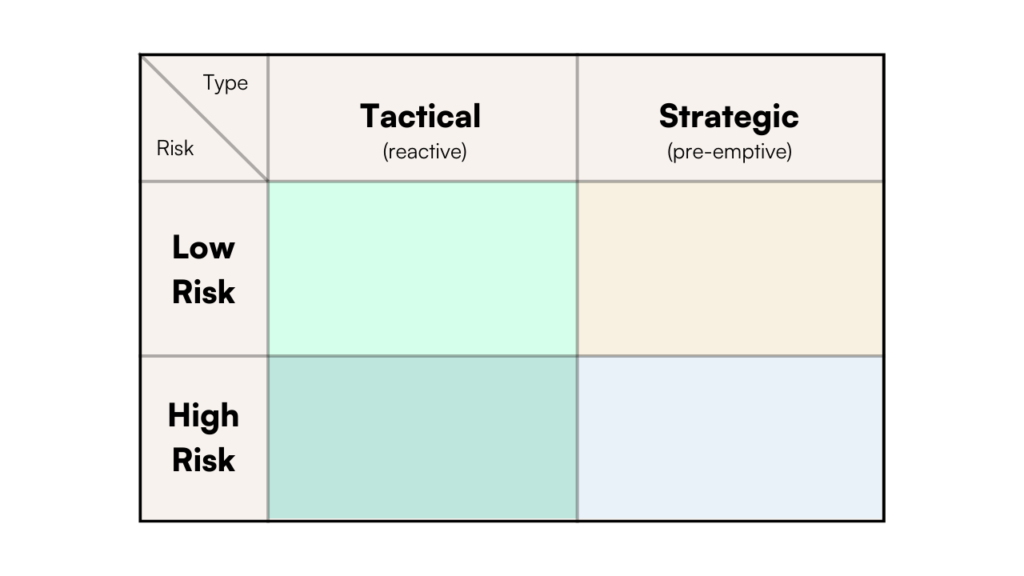
The money matrix, then, breaks down our spending into tactical and strategic expenditure types along the top and then low risk versus high risk along the side.
The idea is that spending falls into two distinct categories: we’re either spending money as a tactical reaction to a need or want OR we’re setting money aside pre-emptively for future use in some way.
Then the risk dimension of the matrix is a broadly a measure of how ‘essential’ that spending is. Merely spending our money on low-risk needs may make life boring and meaningless for some people and merely saving money means we could lose out to inflation. So, some level of high-risk expenditure is often desired.
The goal then is to categorise all our current expenses into this matrix and write down how much we’re spending in each category, as you can see here:

Then to figure out the true baseline of income to be a digital nomad we need to 1) first, go through our low-risk expenses and see if there’s anywhere we can be saving money and 2) second, add up the total amount of low-risk expenses.
I also then like to add 10-15% of income above this number to take account of unexpected low-risk expenses PLUS a few higher-risk expenses that will inevitably happen as a digital nomad (e.g. you want to go on a day trip somewhere or eat out once a week or something).
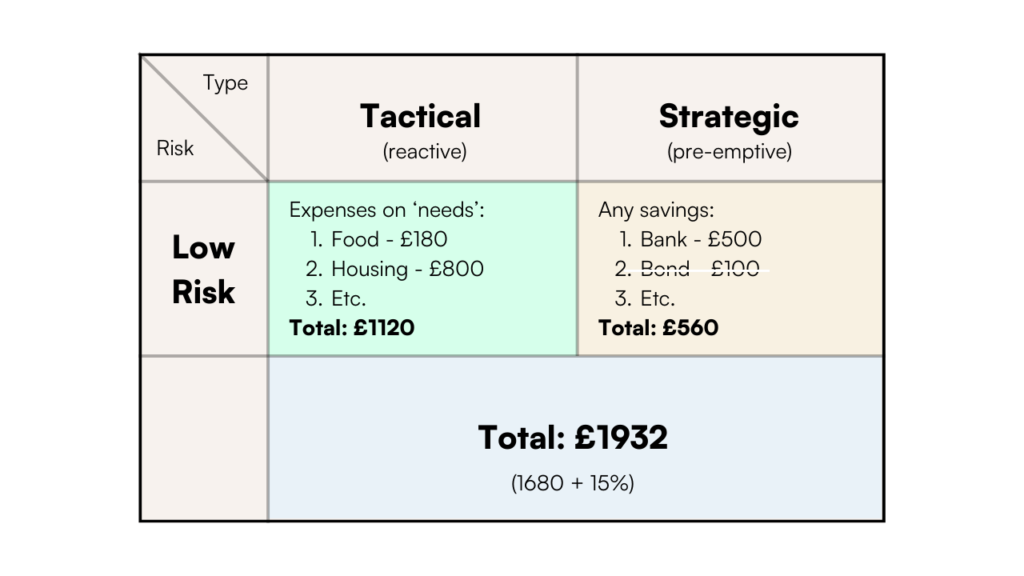
Obviously this isn’t an exact science, but the purpose is we’re starting to think about what our current lifestyle looks like and figuring out how much it would cost us to sustain that long term.
💻 The Job Matrix
Now we’ve figured out how much money we need to bring in our next question is, how do we earn that much money working from anywhere in the world?
This brings me on nicely to the ‘job matrix’
The idea here is that all businesses can be categorised as either location-dependent or location-independent and we either work for that business as an employee or as an entrepreneur. And figuring out where we sit or can sit on this matrix gives us a clearer roadmap for becoming a digital nomad.
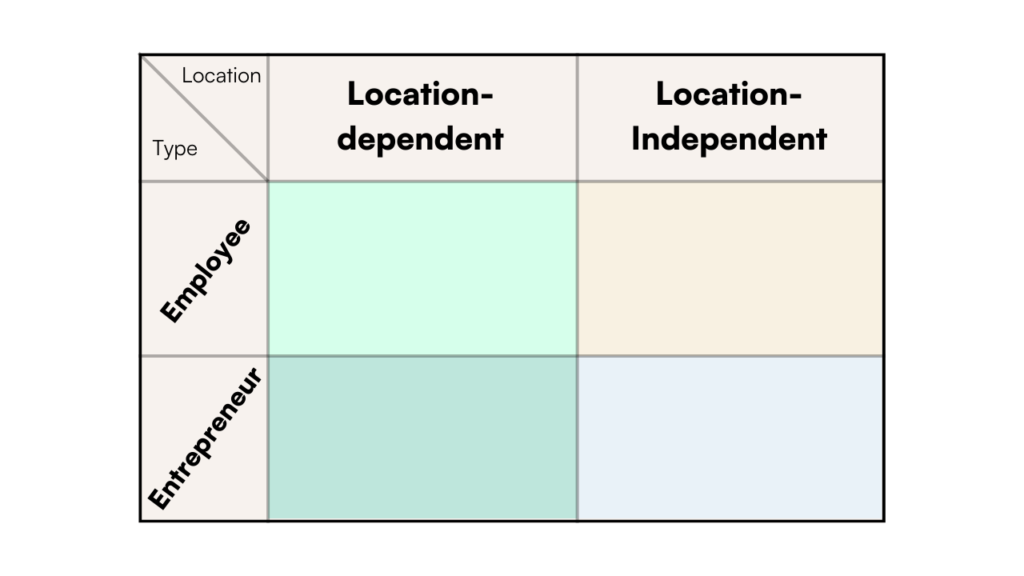
The first category of businesses then are location-dependent. This means that the businesses operate in a specific geographic region (like a country, city, town or whatever) and we’re expected to turn up in that particular location otherwise we’re not going to get paid.
For example, an employee of a location-dependent business would be someone like a builder, who needs to be physically present at a construction site to perform their work. Other examples include a hairdresser working in a salon, a chef in a restaurant, or a retail assistant in a shop. These roles require the individual to be at a specific location to offer their services or perform their duties.
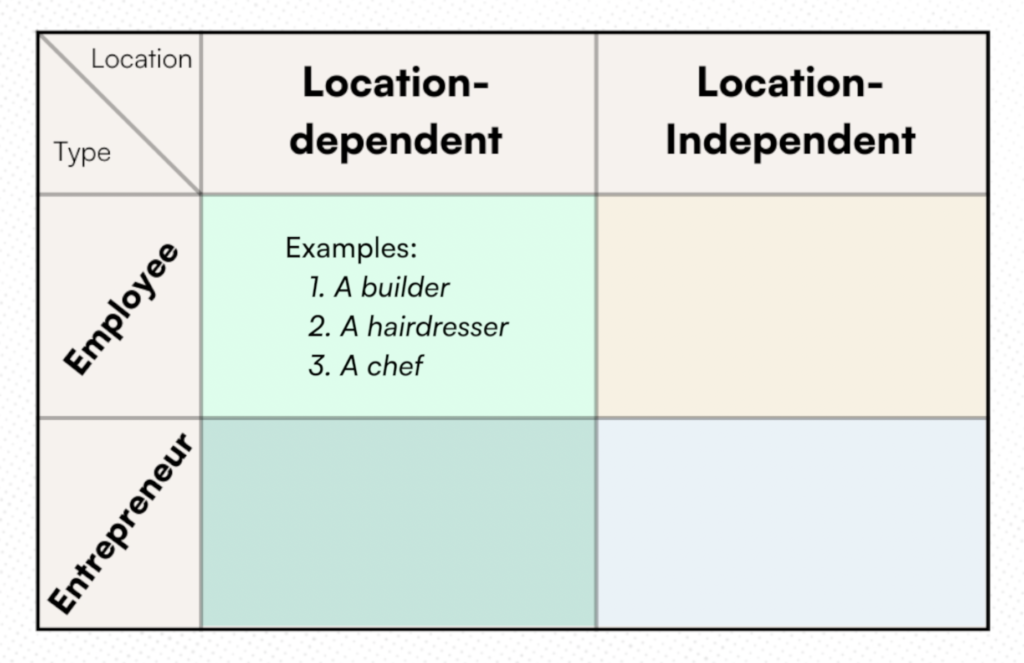
An entrepreneur of a location-dependent business then would be someone like shopkeeper who runs a local boutique, a gym owner who provides fitness services in a particular location, or a garage owner offering vehicle repair services. These entrepreneurs are tied to their physical business locations, where they interact with customers, manage staff, and oversee operations.
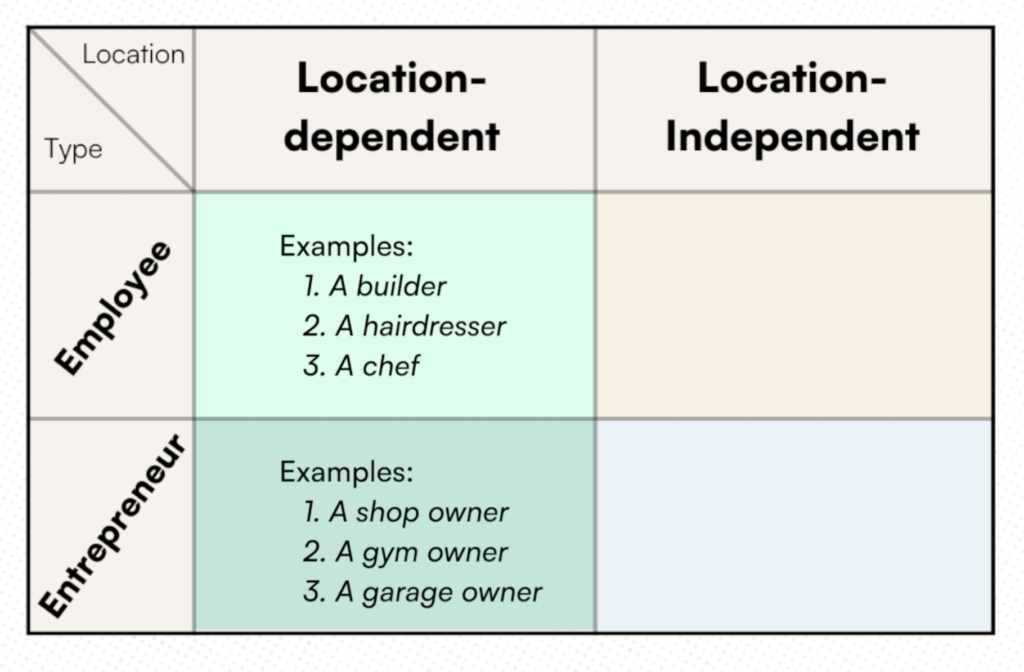
So, if you fall into either of these two categories in a location-dependent business, you’re going to find it almost impossible to become a digital nomad. The solution, then, is to work for a location-independent business instead.
For example, an employee of a location-indepedent business would be someone like a software developer who can work remotely, coding and collaborating with their team online from anywhere in the world. In other words, it’s a totally remote job working for someone else. As long as we do the work and turn up to the meetings, we have complete flexibility to work and live wherever we like.
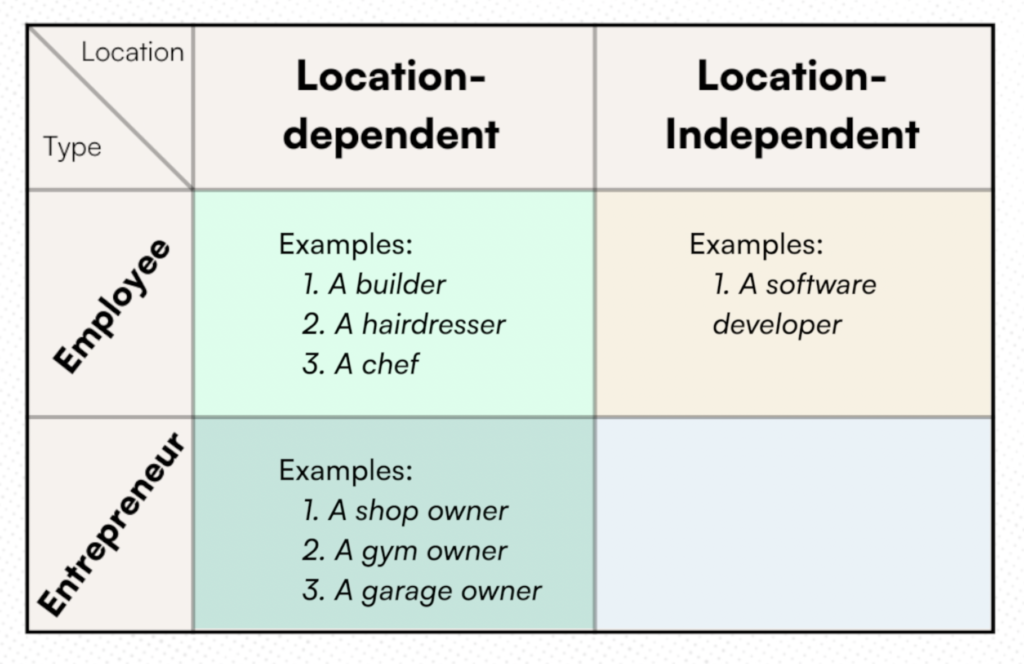
The other category is a location-independent entrepreneurial business, which would be someone like an e-commerce store owner who manages their business entirely online or a freelancer who has a special skillset that they can sell to clients.
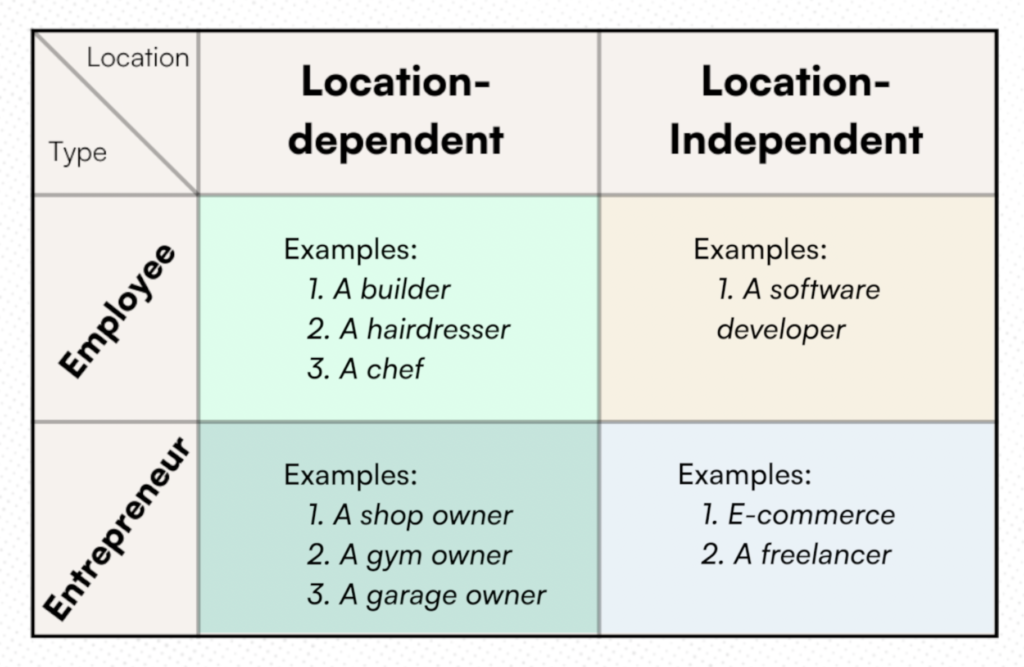
🌈 The Location-Independence Spectrum
So, if a location-indepdent business is the route we need to take if we want to be a digital nomad, what are our available options and where do we start?
Well, I like to think of this as a spectrum:
On the one end of the spectrum we have location-independent jobs where you’re more closely tied to working with or alongisde a business or businesses. Then on the other end of the spectrum we have location-indepndent entrepreneurial activities. And there are only really 4 core things that sit on this specrum:
- Working for someone else in a remote job
- Building your own remote business
- Become an online freelancer
- Or becoming an online creator
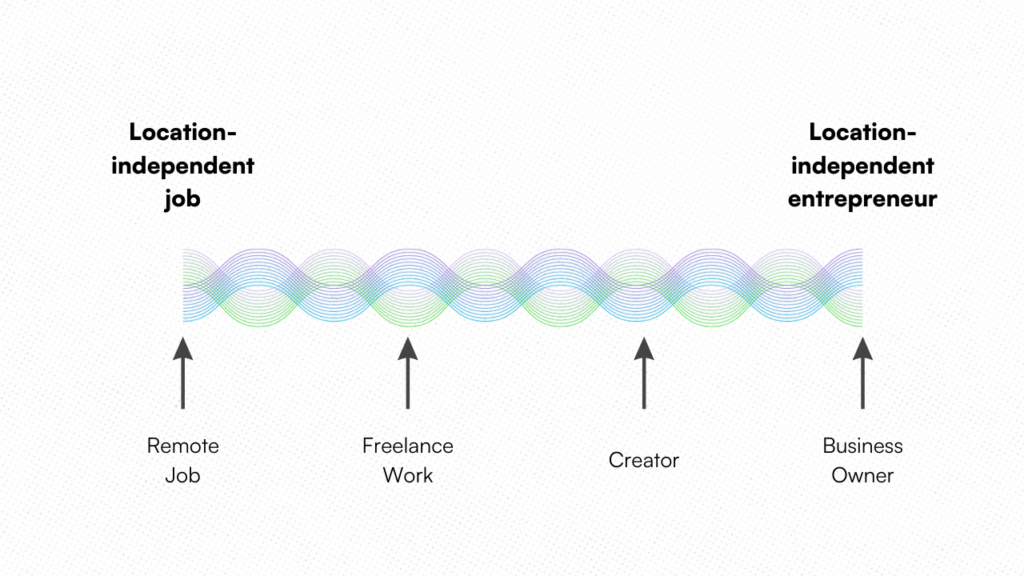
And where you decide to sit on the spectrum doesn’t make a huge amount of difference, although, as a massive generalisation, I find that the further left you are on this spectrum the easier you’ll find it get a regular monthly income that meets your income needs but the less scalable that income is long-term.
Then, the actual process of going down any of these paths have the same THREE fundamental steps:
1 Pick a skill
Now, this can be pretty much anything, but we’re largely looking to learn a skill that has the capacity for remote work.
For example, writing, video editing, graphic design, programming, digital marketing, and sales are all skills that can be performed remotely and have a high demand in the global marketplace.
If you’re not too sure what skill to pick, my advice is to look for your specific knowledge. And by this I mean figuring out the things you were doing as a kid or teenager almost effortlessly. Something you wouldn’t consider a skill, in fact, but the people around you did.
For example, maybe you loved journalling, which could mean you’re well suited to develop your writing skills. Or maybe you played a lot of games so you have a baseline understanding of game theory. Your specific knowlegde is this weird combinatin from your DNA and unique upbrinigng that make you more like to succeed at a certain skill.
2 Get really good at that skill
Put simply, this means just practice that skill a lot.
But my advice would be to get experience in that skill doing it for someone else. For example, if you’re a writer, reach out to your favourite websites or social media accounts and ask if you can help them create new content. Or if you’re a marketer you could walk into your local estate agent and ask if they need helping bringing in qualified leads who are looking to buy a house in the area.
At this stage we’re not really looking to make money but experience, which is why I’d recommend you offer your skill to people for free. You’ll find that by taking your time to hone your craft, get testimonials or case studies from people, and boost your confidence in delivering results you’ll find it 10 times easier to move on to step 3 (leveraging the skill for money).
3 Leverage that skill for money
How we eventually decide to leverage our skill mostly depends on the remote work path we take. I’ll do a proper deep dive into each of these things in the future, and how you can maximise your chances of success, but in short:
- For freelancers, we leverage our skill by using platforms like Upwork and Fiverr, creating a compelling pitch of our services, and either waiting for people to find us or reaching out to people who could benefit from your services. For example, if you do digital marketing and realise a company could be creating better lead magnets you could make a free lead magnet for them, send it to them, and ask if they’d like more lead magnets created at a small cost.
- For creators, like YouTubers or podcasters, we leverage our skill by creating content around the skill we’ve learnt and either make money through advertising revenue or sponsorships or through selling a specific product to our highly-engaged and interested audience. For example, a YouTuber that talks about makeup could be sponsored by a number of makeup brands, but could also decide to launch their own line of makeup.
- For business owners, we leverage our skills by finding problems associated with the skill we’ve learnt and solving it in exchange for money. For example, if our skill is script writing we may notice that one of the biggest problems people face with script writing is keeping people engaged and ensuring we’ve got a decent retention, which was what my friend George noticed, who susbequently launched the retention hub and a YouTube scriptwriting playbook that’s made him a fair chunk of money
- For remote employees, it’s relatively straightforward: we leverage our skill by finding jobs that are looking to hire remotely for our skill. If you did step 2 properly, you should already have a pretty decent portfolio and set of results that demonstrate just how good you are, and you’ll find this is the number one thing you need to land a job regardless of what you’re looking for.

